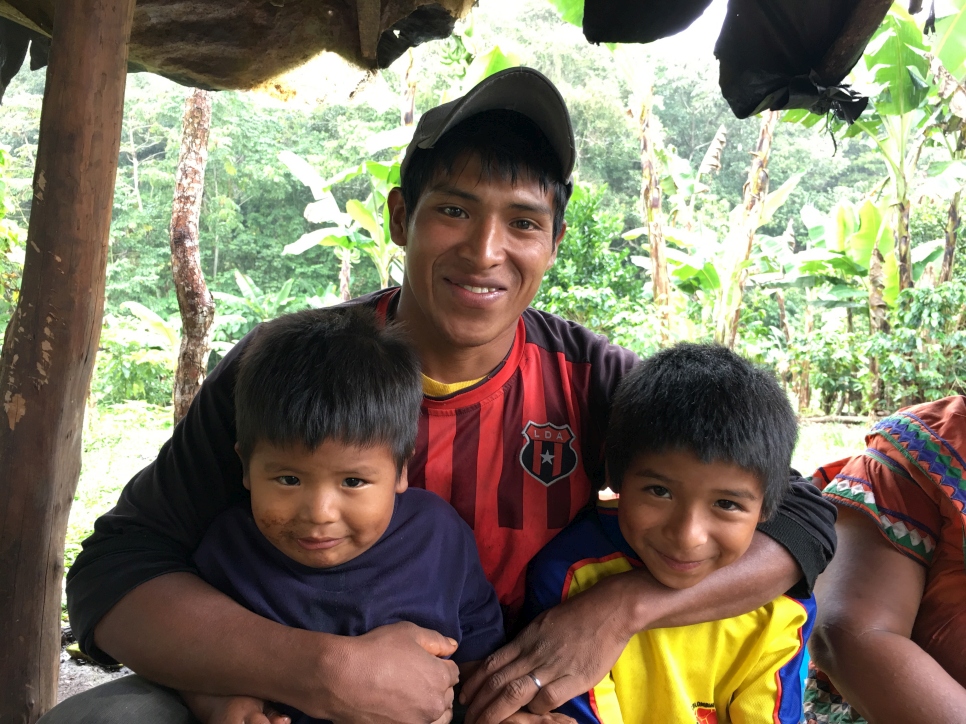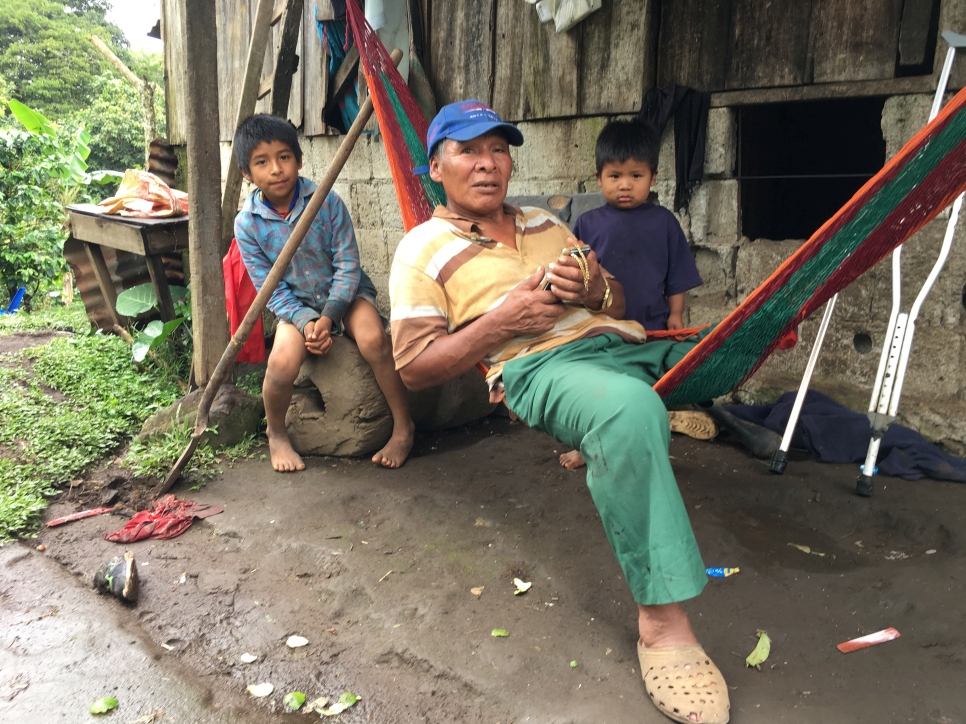Registration drive brings indigenous families out of the shadows
A joint registration campaign by Costa Rica and Panama is helping thousands of Ngäbe-Buglé at risk of statelessness to gain access to health care and education.
Ngäbe-Buglé mother Teresa (top row, fourth from left) poses for a picture with her extended family in Costa Rica.
© UNHCR
Mother-to-be Teresa found herself becoming weaker and weaker as her pregnancy advanced in her home among the indigenous people in the Costa Rican highlands.
“I was two months pregnant when I started feeling bad, I couldn’t walk or anything,” recalls the 23-year-old, who, it emerged, had undiagnosed leukaemia that put her life in grave danger.
“From one day to the next … I couldn’t eat, I was fainting and I couldn’t even walk … I was stick-thin.”
Teresa is a member of the Ngäbe-Buglé community, a traditional indigenous people whose lands are in present-day Costa Rica and Panama in Central America.
Born in Panama, where her birth was unregistered, she had been living in neighbouring Costa Rica without documents since her family crossed the border to pick coffee when she was just 14. Weaker by the day, she did not have access to the medical care she urgently needed, but fortunately help was at hand.
An outreach team working to ensure indigenous families who span the border do not slip through the welfare net had contacted Teresa. They established she needed her Panamanian nationality to be verified and a case worker helped her obtain the documentation.
“I was fainting and I couldn’t even walk … They came to the house and helped me with the paperwork.”
“They came to the house and helped me with the paperwork,” she says. Granted permanent resident status in Costa Rica, she was swiftly enrolled in the national health care system and treated at a hospital in the Costa Rican capital, San Jose.
After a bone-marrow transplant and course of chemotherapy, Teresa is back at home with her son, now aged two, and her extended family.
About a quarter of a million Ngäbe-Buglé members live in northwest Panama, of whom an estimated 15,000 cross the border informally to work during the coffee harvest in southern Costa Rica.
Teresa is one of thousands of indigenous people helped by the drive by the Costa Rican Civil Registry Office and its Panamanian counterpart, supported by UNHCR, the UN Refugee Agency.

Norberto Andrade, 28, embraces his four-year-old relative Pablo (left) and nine-year-old Moises (right) at the farm where they live and work in the highlands of southeast Costa Rica. © UNHCR/Tim Gaynor
Outreach workers for the drive – known locally as the ‘Chiriticos Project’ – set out on motorcycles, in cars and sometimes on foot to remote areas on either side of the border where Ngäbe-Buglé families work as migrant coffee pickers in the rich agricultural uplands.
Since its beginnings in 2014, project workers have contacted more than 19,370 people. While most were found to have Panamanian or Costa Rican citizenship, they identified and assisted more than 3,600 individuals at risk of statelessness because they were not registered in either country.
“There were so many children without the right to health care, education or an identity,” says Eduardo Salazar, a Costa Rican official who heads the Supreme Electoral Tribunal’s civil registry in San Vito, which held its seventh outreach push in late 2017.
The project was intended to give them legal status by registering them in Costa Rica or Panama, so that they had access to services on one side of the border or the other, he adds.
Indigenous people have suffered generational poverty, and high rates of infant mortality and diseases such as HIV and tuberculosis, health officials say.
“If they don’t get papers, they can’t get school documentation or grants to continue their education."
To make them part of national life, the two governments are issuing birth certificates after the fact, sometimes using documentation such as vaccination certificates, to establish an individual’s identity.
"In Teresa’s case, registration saved her life,” says Dr. Pablo Ortiz, the former director of health in the region, who has worked with indigenous groups for more than three decades.
The programme is also vitally important to allow children to register in schools, progress through the education system, enjoy labour rights once they start to work and exercise their right to vote, Salazar and Ortiz say.
“If they don’t get these papers, they can’t get school documentation and, later, grants to continue their education. They also miss out on a programme to help those of limited resources get a deposit for a house. They get left at the margins.”
The registration drive, in its fourth year, is also helping to build trust with indigenous people, many of whom, like agricultural worker Norberto Andrade, have spent their lives on the margins. Before he received his Costa Rican identity documents, the 27-year-old says he felt “like a stray dog”.
“Now I have the documents, I feel free. I’ve got papers to show for work.”
“You had to hide yourself, in case the police asked you questions,” he says, chatting in a tin-roofed shack at a coffee farm where we he works, a few miles from the Panamanian border. “But now I have the documents, I feel free. I’ve got papers to show for work.”
He has hopes for his two daughters, aged one and three, who have birth certificates. “They were born here and they now have a future here. They can go to school, get an education and progress in life, become important people.”
His father, Don Martin Andrade, is also pleased at the opportunities that have opened up for him, his children and grandchildren, since they received their ID papers.
“They have given us a vote … we are in the electoral register,” he says, adding that he plans to vote in the next election.
There are at least 10 million people around the world who have no nationality and consequently face a lifetime of obstacles and disappointments. Salazar believes the cooperative approach adopted in the Costa Rican-Panamanian borderlands could be applied in other countries.
“All it costs is a motorbike and some fuel,” he says. “The spirit of the project could be applied anywhere. We are talking about a problem of identification, of the risk of statelessness. There are ways of tackling this problem in a systematic way.”

Head of the family Don Martin Andrade lies in a hammock at the farm where his family live and work in the highlands of southeast Costa Rica. He is flanked by Moises (left) and and Pablo (right). © UNHCR/Tim Gaynor
